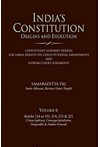
- Author(s): Samaraditya Pal
- Publisher: LexisNexis
- Edition: Ed 2016
- ISBN 13 9789351438564
- Approx. Pages 1339 + Contents
- Delivery Time Normally 7-9 working days
............................................................................................................................
Description
Article 124 to 151,214,215, & 221 (Union Judiciary, Contempt Jurisdiction,
Comptroller & Auditor-General)
In this volume, we have covered Chapter IV of Part V (Articles 124 to 147) dealing with the Union Judiciary (the Supreme Court), Chapter V (Articles 148 to 151) dealing with the Comptroller and Auditor General of India, Articles 129 and 215 dealing with the Contempt jurisdiction of the Supreme Court and the High Courts respectively and Article 214 dealing with the setting up of High Courts in the States. The role of the Supreme Court in India's constitutional scheme is pivotal. It is the final interpreter and upholder of the Constitution and its independence is essential. There have been recent developments regarding the appointment of Judges of the Court and High Courts. The Collegium system of the Judges appointing Judges, which had been formulated by the Court itself, was sought to be replaced by Parliament by amending the Constitution1 and providing for a National Judicial Appointments Commission to appoint Judges. The amendment raised questions of whether the primacy of the Chief Justice of India in the matter of appointment of the Judges to the Higher Judiciary, as held by the Court itself, had been abrogated. The Supreme Court Advocates-on-Record Association challenged both the Constitutional amendment and the National Judicial Appointments Commission Act, 2014 before Court. The challenge was upheld by a Constitution Bench and both the Act and the Amendment were struck down by the decision of the majority. The Collegium system, therefore, has been retained but the Court has asked for suggestions to improve the system, as the perception that the Collegium has not been always successful in ensuring appointment of the most deserving persons as Judges had led to the passing of the Amendment in the first place. This issue, along with the overall issue of independence of the Judiciary has been dealt with in detail in the Overview to the Chapter on Article 124.
............................................................................................................................
Contents
Articles 124,124A,124B and 124C
Articles 125 and 221
Articles 126
Articles 127
Articles 128
Articles 129 and 215
Article 130
Article 131
Article 132
Article 133
Article 134
Article 134A
Article 135
Article 136
Article 137
Article 138
Article 139
Article 139A
Article 140
Article 141
Article 142
Article 143
Article 144
Article 145
Article 146
Article 147
Article 214
Article 148 - 151
Appendix I
Appendix II
Appendix III
Subject Index
............................................................................................................................
